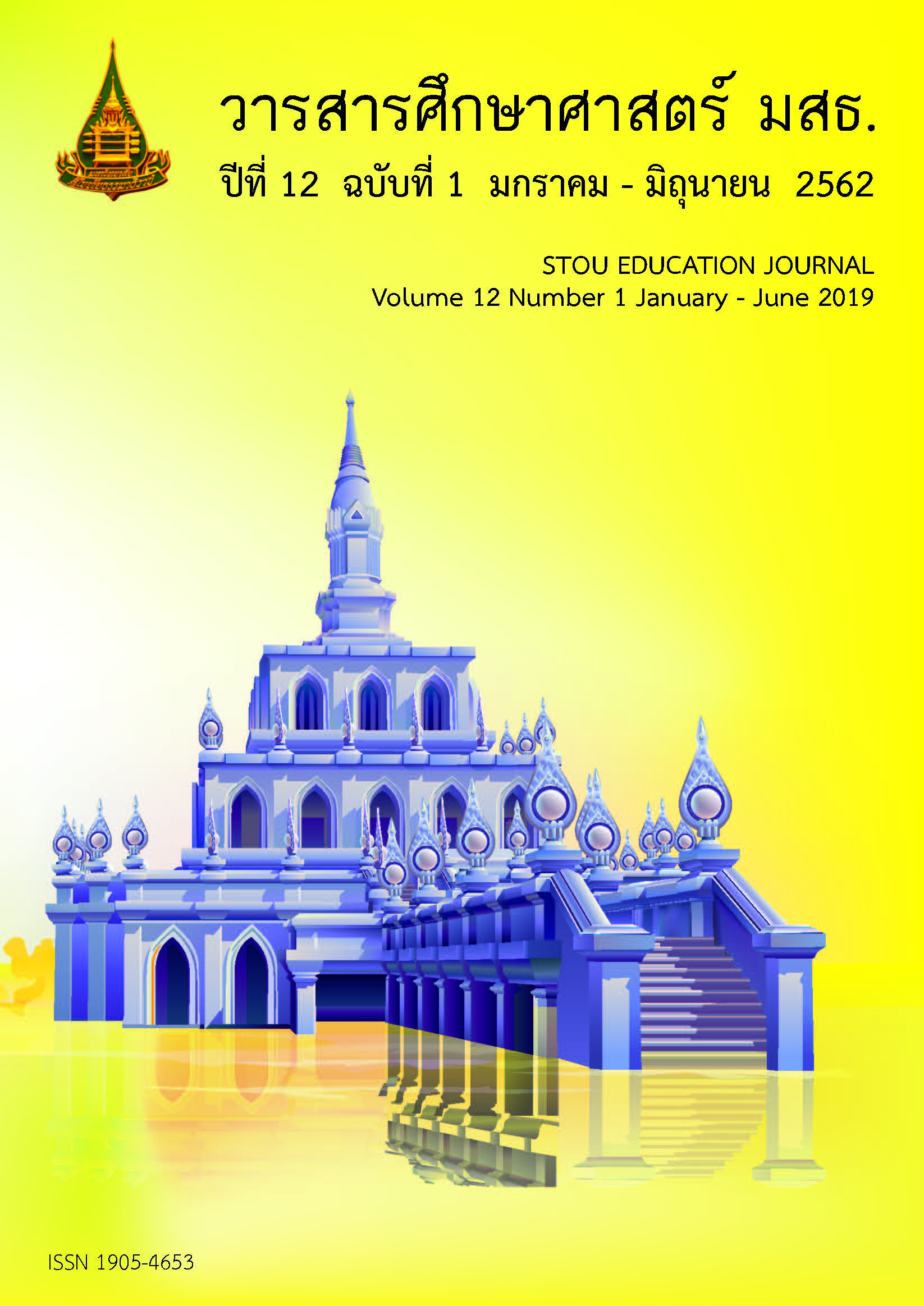การจัดประสบการณ์การเรียนรู้แบบสะเต็มศึกษาเรื่อง วัฒนธรรมท้องถิ่นจังหวัดนนทบุรี เพื่อพัฒนาความคิดสร้างสรรค์สำหรับเด็กปฐมวัย
Main Article Content
บทคัดย่อ
การศึกษาครั้งนี้มีวัตถุประสงค์เพื่อศึกษาความคิดสร้างสรรค์ของเด็กปฐมวัยที่ผ่านการจัดประสบการณ์การเรียนรู้แบบสะเต็มศึกษาเรื่อง วัฒนธรรมท้องถิ่นจังหวัดนนทบุรี กลุ่มเป้าหมายที่ใช้ในการศึกษาครั้งนี้ คือ เด็กปฐมวัยชายและหญิงที่มีอายุระหว่าง 4-5 ปี ที่กำลังศึกษาอยู่ในระดับชั้นอนุบาลปีที่ 1 ภาคเรียนที่ 2 ปีการศึกษา 2560 จำนวน 25 คน ของโรงเรียนวัดใหม่ผดุงเขต จังหวัดนนทบุรี เครื่องมือที่ใช้ในการศึกษา ได้แก่ แผนการจัดประสบการณ์การเรียนรู้สะเต็มศึกษาเรื่อง วัฒนธรรมท้องถิ่นจังหวัดนนทบุรีที่พัฒนาความคิดสร้างสรรค์จำนวน 24 แผน และแบบประเมินความคิดสร้างสรรค์ของเด็กปฐมวัยที่ผู้ศึกษาสร้างขึ้น วิเคราะห์ข้อมูลโดยใช้ค่าเฉลี่ย ส่วนเบี่ยงเบนมาตรฐาน และการวิเคราะห์เนื้อหา ผลการศึกษาพบว่า เด็กปฐมวัยที่ได้รับการจัดประสบการณ์การเรียนรู้แบบสะเต็มศึกษา
เรื่องวัฒนธรรมท้องถิ่นจังหวัดนนทบุรีมีคะแนนความคิดสร้างสรรค์หลังการทดลองสูงกว่าก่อนการทดลอง ผลจาก
การสังเกตพบว่าเด็กปฐมวัยมีการพัฒนาความคิดสร้างสรรค์มากขึ้นทั้ง 4 ด้าน ได้แก่ ความคิดริเริ่ม ความคิดคล่องแคล่ว ความคิดยืดหยุ่น ความคิดละเอียดลออ
Article Details
เอกสารอ้างอิง
กระทรวงศึกษาธิการ. (2560). หลักสูตรการศึกษาปฐมวัย พุทธศักราช 2560. กรุงเทพมหานคร: สำนักวิชาการ.
ชัยวัฒน์ สุทธิรัตน์. (2553). เทคนิคการใช้คำถาม พัฒนาการคิด. นนทบุรี: สหมิตรการพิมพ์แอนด์พลับลิชชิ่ง.
ชลาธิป สมาหิโต. (2557). การจัดประสบการณ์การเรียนรู้ตามแนวสะเต็มศึกษาในระดับการศึกษาปฐมวัย. ศึกษาศาสตร์ปริทัศน์, 30 (2), 102-110.
นลินี ล้วนลักษณ์. (2559). การจัดกิจกรรมตามแนวสะเต็มศึกษาเรื่อง ของดีเมืองราชบุรีที่มีต่อความสามารถในการแก้ปัญหาของเด็กปฐมวัย. (การศึกษาค้นคว้าอิสระศึกษาศาสตรมหาบัณฑิต ไม่ได้ตีพิมพ์). มหาวิทยาลัยเกษตรศาสตร์, กรุงเทพมหานคร.
พิศาล บุญผูก. (2560). นนทบุรีศรีมหานคร. นนทบุรี: โรงพิมพ์มหาวิทยาลัยสุโขทัยธรรมาธิราช.
วศิณีย์ อิศรเสนา. (2559). เรื่องน่ารู้เกี่ยวกับ STEM Education สะเต็มศึกษา. กรุงเทพฯ: โรงพิมพ์แห่งจุฬาลงกรณ์มหาวิทยาลัย.
ศุภวรรณ เจริญชัยสมบัติ. (2554). การเปลี่ยนแปลงสิ่งแวดล้อมและวิถีชีวิตชุมชนจากการท่องเที่ยว: กรณีศึกษาเกาะเกร็ด จังหวัดนนทบุรี. (วิทยานิพนธ์ปริญญามหาบัณฑิต ไม่ได้ตีพิมพ์). มหาวิทยาลัยศิลปากร, นครปฐม.
สำนักงานส่งเสริมวิสาหกิจขนาดกลางและขนาดย่อม. (2550). เจ้านายเล็กๆ – ยุวกษัตริย์. กรุงเทพฯ: สำนักงานส่งเสริมวิสาหกิจขนาดกลางและขนาดย่อม.
อัญชลี ไสยวรรณ. (2558) . การจัดการเรียนรู้แบบสะเต็ม (STEM) ระดับการศึกษาปฐมวัย. นักบริหาร, 33 (2) , 49-56.
อารี รังสินันท์. (2549). ความคิดสร้างสรรค์ . (พิมพ์ครั้งที่ 3). กรุงเทพฯ: ใยไหม.
Dewey, J. (1969). Experience and education. New York: Macmillan Publishing.
Guillford, J, P. (1967). The nature of human intelligence. New York : McGraw-Hill.
National Research Council of the National Academes. ( 2011). Successful K-12 STEM education: Identifying effective approaches in science, technology, engineering and, mathematics. Washington D.C.: The National Academic Press.
Torrance, P, E. (1969). Creative learning and teaching. New York: Book Mead Company.


